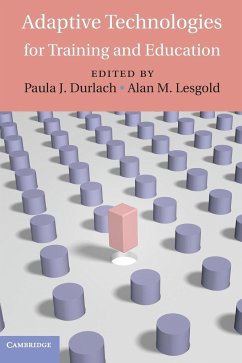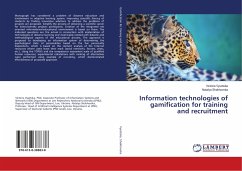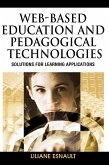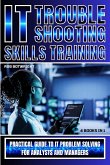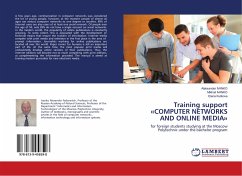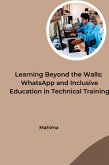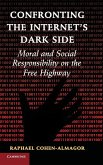Adaptive Technologies for Training and Education
Herausgeber: Durlach, Paula J.; Lesgold, Alan M.
Adaptive Technologies for Training and Education
Herausgeber: Durlach, Paula J.; Lesgold, Alan M.
- Gebundenes Buch
- Merkliste
- Auf die Merkliste
- Bewerten Bewerten
- Teilen
- Produkt teilen
- Produkterinnerung
- Produkterinnerung
The purpose of this volume is to provide an overview of the latest advancements in computer-based training.
Andere Kunden interessierten sich auch für
![Information technologies of gamification for training and recruitment Information technologies of gamification for training and recruitment]() Victoria VysotskaInformation technologies of gamification for training and recruitment34,99 €
Victoria VysotskaInformation technologies of gamification for training and recruitment34,99 €![Web-Based Education and Pedagogical Technologies Web-Based Education and Pedagogical Technologies]() Liliane EsnaultWeb-Based Education and Pedagogical Technologies107,99 €
Liliane EsnaultWeb-Based Education and Pedagogical Technologies107,99 €![IT Troubleshooting Skills Training IT Troubleshooting Skills Training]() Rob BotwrightIT Troubleshooting Skills Training48,99 €
Rob BotwrightIT Troubleshooting Skills Training48,99 €![Training support «COMPUTER NETWORKS AND ONLINE MEDIA» Training support «COMPUTER NETWORKS AND ONLINE MEDIA»]() Aleksander IvankoTraining support «COMPUTER NETWORKS AND ONLINE MEDIA»36,99 €
Aleksander IvankoTraining support «COMPUTER NETWORKS AND ONLINE MEDIA»36,99 €![Learning Beyond the Walls: WhatsApp and Inclusive Education in Technical Training Learning Beyond the Walls: WhatsApp and Inclusive Education in Technical Training]() MahimaLearning Beyond the Walls: WhatsApp and Inclusive Education in Technical Training28,49 €
MahimaLearning Beyond the Walls: WhatsApp and Inclusive Education in Technical Training28,49 €![Parallel Implementations of Backpropagation Neural Networks on Transputers: A Study of Training Set Parallelism Parallel Implementations of Backpropagation Neural Networks on Transputers: A Study of Training Set Parallelism]() P. SaratchandranParallel Implementations of Backpropagation Neural Networks on Transputers: A Study of Training Set Parallelism62,99 €
P. SaratchandranParallel Implementations of Backpropagation Neural Networks on Transputers: A Study of Training Set Parallelism62,99 €![Confronting Internet's Dark Side Confronting Internet's Dark Side]() Raphael Cohen-AlmagorConfronting Internet's Dark Side118,99 €
Raphael Cohen-AlmagorConfronting Internet's Dark Side118,99 €-
-
-
The purpose of this volume is to provide an overview of the latest advancements in computer-based training.
Hinweis: Dieser Artikel kann nur an eine deutsche Lieferadresse ausgeliefert werden.
Hinweis: Dieser Artikel kann nur an eine deutsche Lieferadresse ausgeliefert werden.
Produktdetails
- Produktdetails
- Verlag: Cambridge University Press
- Seitenzahl: 380
- Erscheinungstermin: 1. Februar 2012
- Englisch
- Abmessung: 260mm x 183mm x 25mm
- Gewicht: 908g
- ISBN-13: 9780521769037
- ISBN-10: 0521769035
- Artikelnr.: 34224579
- Herstellerkennzeichnung
- Produktsicherheitsverantwortliche/r
- Europaallee 1
- 36244 Bad Hersfeld
- gpsr@libri.de
- Verlag: Cambridge University Press
- Seitenzahl: 380
- Erscheinungstermin: 1. Februar 2012
- Englisch
- Abmessung: 260mm x 183mm x 25mm
- Gewicht: 908g
- ISBN-13: 9780521769037
- ISBN-10: 0521769035
- Artikelnr.: 34224579
- Herstellerkennzeichnung
- Produktsicherheitsverantwortliche/r
- Europaallee 1
- 36244 Bad Hersfeld
- gpsr@libri.de
1. Adaptive educational systems Valerie Shute and Diego Zapata-Rivera; 2.
Adaptive expertise as acceleration of future learning: a case study Kurt
VanLehn and Min Chi; 3. Adaptive hypermedia for education and training
Peter Brusilovsky; 4. Progress in assessment and tutoring of lifelong
learning skills: an intelligent tutor agent that helps students become
better help seekers Vincent Aleven, Ido Roll and Kenneth R. Koedinger; 5.
Student modeling and intelligent tutoring beyond coached problem solving
Cristina Conati; 6. Emotions during learning with autotutor Sidney D'Mello
and Art Graesser; 7. Lifelong learner modelling Judy Kay and Bob
Kummerfeld; 8. Training decisions from experience with decision-making
games Cleotilde Gonzalez; 9. Ill-defined domains and adaptive tutoring
technologies Collin Lynch, Kevin D. Ashley, Niels Pinkwart and Vincent
Aleven; 10. Individualized cultural and social skills learning with virtual
humans H. Chad Lane and Bob Wray; 11. Emergent assessment opportunities: a
foundation for configuring adaptive training environment Phillip M. Mangos,
Gwendolyn Campbell, Matthew Lineberry and Ami E. Bolton; 12. Semantic
adaptive training John Flynn; 13. Speech and language processing for
adaptive training Diane J. Litman; 14. The art and science of developing
intercultural competence W. Lewis Johnson, LeeEllen Friedland, Aaron Watson
and Eric Surface; 15. Practical issues in the deployment of new training
technology Alan Lesgold; 16. A model-driven instructional strategy: the
benchmarked experiential system for training (BEST) Georgiy Levchuk, Wayne
Shebilske and Jared Freeman; 17. Exploring design-based research for
military training environments Marie Bienkowski; 18. Conclusion Paula
Durlach and Alan Lesgold.
Adaptive expertise as acceleration of future learning: a case study Kurt
VanLehn and Min Chi; 3. Adaptive hypermedia for education and training
Peter Brusilovsky; 4. Progress in assessment and tutoring of lifelong
learning skills: an intelligent tutor agent that helps students become
better help seekers Vincent Aleven, Ido Roll and Kenneth R. Koedinger; 5.
Student modeling and intelligent tutoring beyond coached problem solving
Cristina Conati; 6. Emotions during learning with autotutor Sidney D'Mello
and Art Graesser; 7. Lifelong learner modelling Judy Kay and Bob
Kummerfeld; 8. Training decisions from experience with decision-making
games Cleotilde Gonzalez; 9. Ill-defined domains and adaptive tutoring
technologies Collin Lynch, Kevin D. Ashley, Niels Pinkwart and Vincent
Aleven; 10. Individualized cultural and social skills learning with virtual
humans H. Chad Lane and Bob Wray; 11. Emergent assessment opportunities: a
foundation for configuring adaptive training environment Phillip M. Mangos,
Gwendolyn Campbell, Matthew Lineberry and Ami E. Bolton; 12. Semantic
adaptive training John Flynn; 13. Speech and language processing for
adaptive training Diane J. Litman; 14. The art and science of developing
intercultural competence W. Lewis Johnson, LeeEllen Friedland, Aaron Watson
and Eric Surface; 15. Practical issues in the deployment of new training
technology Alan Lesgold; 16. A model-driven instructional strategy: the
benchmarked experiential system for training (BEST) Georgiy Levchuk, Wayne
Shebilske and Jared Freeman; 17. Exploring design-based research for
military training environments Marie Bienkowski; 18. Conclusion Paula
Durlach and Alan Lesgold.
1. Adaptive educational systems Valerie Shute and Diego Zapata-Rivera; 2.
Adaptive expertise as acceleration of future learning: a case study Kurt
VanLehn and Min Chi; 3. Adaptive hypermedia for education and training
Peter Brusilovsky; 4. Progress in assessment and tutoring of lifelong
learning skills: an intelligent tutor agent that helps students become
better help seekers Vincent Aleven, Ido Roll and Kenneth R. Koedinger; 5.
Student modeling and intelligent tutoring beyond coached problem solving
Cristina Conati; 6. Emotions during learning with autotutor Sidney D'Mello
and Art Graesser; 7. Lifelong learner modelling Judy Kay and Bob
Kummerfeld; 8. Training decisions from experience with decision-making
games Cleotilde Gonzalez; 9. Ill-defined domains and adaptive tutoring
technologies Collin Lynch, Kevin D. Ashley, Niels Pinkwart and Vincent
Aleven; 10. Individualized cultural and social skills learning with virtual
humans H. Chad Lane and Bob Wray; 11. Emergent assessment opportunities: a
foundation for configuring adaptive training environment Phillip M. Mangos,
Gwendolyn Campbell, Matthew Lineberry and Ami E. Bolton; 12. Semantic
adaptive training John Flynn; 13. Speech and language processing for
adaptive training Diane J. Litman; 14. The art and science of developing
intercultural competence W. Lewis Johnson, LeeEllen Friedland, Aaron Watson
and Eric Surface; 15. Practical issues in the deployment of new training
technology Alan Lesgold; 16. A model-driven instructional strategy: the
benchmarked experiential system for training (BEST) Georgiy Levchuk, Wayne
Shebilske and Jared Freeman; 17. Exploring design-based research for
military training environments Marie Bienkowski; 18. Conclusion Paula
Durlach and Alan Lesgold.
Adaptive expertise as acceleration of future learning: a case study Kurt
VanLehn and Min Chi; 3. Adaptive hypermedia for education and training
Peter Brusilovsky; 4. Progress in assessment and tutoring of lifelong
learning skills: an intelligent tutor agent that helps students become
better help seekers Vincent Aleven, Ido Roll and Kenneth R. Koedinger; 5.
Student modeling and intelligent tutoring beyond coached problem solving
Cristina Conati; 6. Emotions during learning with autotutor Sidney D'Mello
and Art Graesser; 7. Lifelong learner modelling Judy Kay and Bob
Kummerfeld; 8. Training decisions from experience with decision-making
games Cleotilde Gonzalez; 9. Ill-defined domains and adaptive tutoring
technologies Collin Lynch, Kevin D. Ashley, Niels Pinkwart and Vincent
Aleven; 10. Individualized cultural and social skills learning with virtual
humans H. Chad Lane and Bob Wray; 11. Emergent assessment opportunities: a
foundation for configuring adaptive training environment Phillip M. Mangos,
Gwendolyn Campbell, Matthew Lineberry and Ami E. Bolton; 12. Semantic
adaptive training John Flynn; 13. Speech and language processing for
adaptive training Diane J. Litman; 14. The art and science of developing
intercultural competence W. Lewis Johnson, LeeEllen Friedland, Aaron Watson
and Eric Surface; 15. Practical issues in the deployment of new training
technology Alan Lesgold; 16. A model-driven instructional strategy: the
benchmarked experiential system for training (BEST) Georgiy Levchuk, Wayne
Shebilske and Jared Freeman; 17. Exploring design-based research for
military training environments Marie Bienkowski; 18. Conclusion Paula
Durlach and Alan Lesgold.

